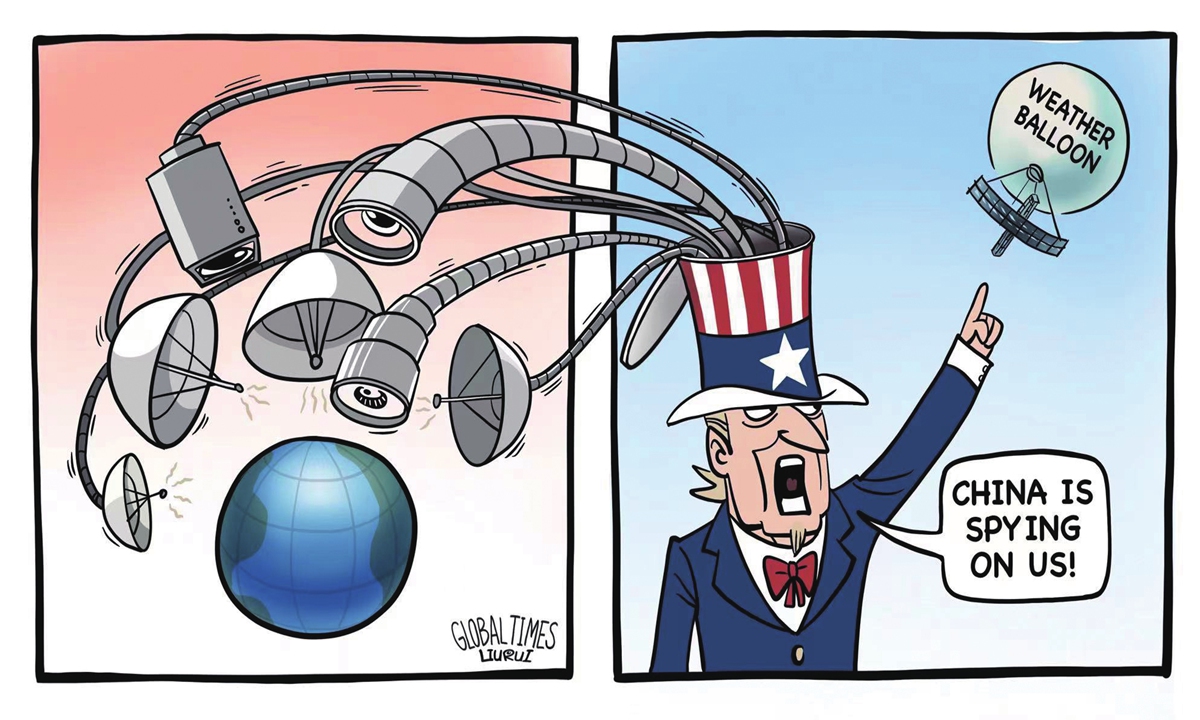
US double standards. Cartoon: Carlos Latuff
Regardless of the authenticity of the leaked documents purportedly revealing details of four Chinese "balloons," the purpose of the US' continuous hyping of the incident is to create a consensus of fear toward China among Americans, and to hype so-called China's lack of respect to the US in the international community, experts said on Sunday.
According to The Washington Post on Saturday, a document produced by the US National Geospatial-Intelligence Agency dated February 15 contains the most detailed government assessment to date of three Chinese airships.
Citing intelligence analysts, the US media outlet assessed that one of the "balloons" that flew over the US in February could generate enough power to operate "any" surveillance and reconnaissance technology, including a type of radar that can see at night and through clouds and thin materials.
However, Chinese military experts said that some of the content mentioned in this leaked document cannot be counted as so-called evidence, but rather serves the political purpose of the US to continue hyping the so-called threat of China's civilian unmanned airship, while exaggerating the military use of Chinese civilian airship.
Using high altitude balloons for scientific research activities has become an international norm, with data from the China Science Daily showing that by 2018, the US had released more than 2,000 high altitude balloons, France around 3,000, and Japan more than 800.
Civilian balloons include two categories. Some are released by scientific research units for purposes that include monitoring atmospheric circulation and meteorological detection, and the other comes from companies, such as Google, which use balloons for navigation and communication, Chinese military expert Song Zhongping told the Global Times on Sunday.
In the leaked classified documents published by The Washington Post, it assessed that the solar panels on one balloon could generate upward of 10,000 watts of solar power, more than enough to operate any surveillance capability, including synthetic aperture radar.
However, experts said that the mention of solar panels can only illustrate the good quality, cost-effectiveness, and energy storage efficiency of China's solar panels. "The US' 'free' advertisement for China's solar panels allows more countries around the world to recognize that China's solar panels perform very well," Song said.
In addition, experts pointed out that the leaked documents only reflect that the US is an untrustworthy country that cannot keep secrets. "Who would dare believe and engage with a country that can't keep secrets? This is a vivid portrayal of the loss of credibility of the US in the world, especially among its allies," Li Haidong, a professor at the China Foreign Affairs University, told the Global Times.
According to the provisions of the Convention on International Civil Aviation (Chicago Convention), the civilian unmanned airship has the same legal status as civil aircraft. It is clear that the US has not obtained any evidence, only speculation that the solar panel is providing power to remote sensing equipment, which is completely unfounded, experts said.
At the same time, the Financial Times published an article entitled "China stalls Antony Blinken's Beijing visit over 'spy balloon' concerns" on Saturday, alleging that China is refusing to let US Secretary of State Antony Blinken visit Beijing over concerns that the FBI will release the results of an investigation into the downed suspected Chinese "spy balloon."
The US has always tried to impose pressure on China before high-level US officials' visit to force concessions from China in communication with the US, experts said. Even if there were no balloon incidents, there would be other incidents.
This approach demonstrates that the US lacks sincerity in handling its relationship with China and is an attempt to force China to cave in by coercion, threats, and intimidation, Li said. The US' intention to link the "balloon incident" to Blinken's postponed visit to China is to shift blame onto China for all the problems, obstacles or inconveniences in China-US relations.
"The whole thing is a shameful event directed by the US, which exposes the US' true intentions of creating chaos in China-US relations and regional security. This is both sinister and pathetic," Li said.




